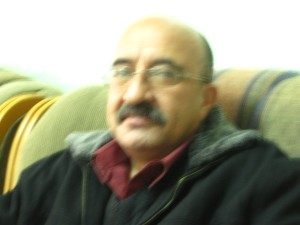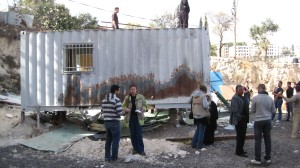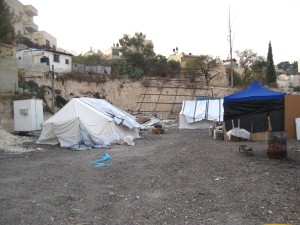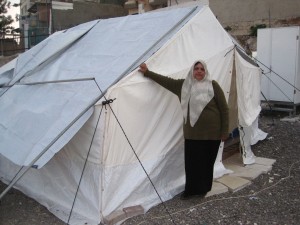A DOCTOR AND HIS SON
 Salim Anati is a Palestinian doctor who could have chosen to live a comfortable life in an untroubled part of the world. However, in 1987, 2 years after finishing medical school in Romania, his life took on a determined course after the first Intifada broke out. A fourteen year old cousin was killed, and as he said, “This event stopped me.” His realization at that time was that “it’s better to remain here to help my people.” Opening a clinic in his home was the way he chose to serve the people of Shu’fat refugee camp. From his living room clinic he saw 70 – 100 patients a day.
Salim Anati is a Palestinian doctor who could have chosen to live a comfortable life in an untroubled part of the world. However, in 1987, 2 years after finishing medical school in Romania, his life took on a determined course after the first Intifada broke out. A fourteen year old cousin was killed, and as he said, “This event stopped me.” His realization at that time was that “it’s better to remain here to help my people.” Opening a clinic in his home was the way he chose to serve the people of Shu’fat refugee camp. From his living room clinic he saw 70 – 100 patients a day.
Over the years he has worked in a number of capacities in the medical field. He is a well- respected and influential man with many international connections. Among many other responsibilities, he is the director of the board for the Shu’fat community center and school, serving children and also providing work for women in the area. It is through volunteering at the center that I first got to know him.
On a recent visit in his home, I met with him and his son and heard the following story, part of which was gleaned from an email he wrote:
Dr. Anati’s 19 yr. old son, Ahmad, was returning home from the university one day on a public bus. There were a number of other students on the bus at the time that it was stopped at what is called a “flying checkpoint,” a spontaneous checkpoint set up anywhere and anytime that the military chooses. From the bus about 20 young males, all from Shu’fat, were told to get off. There was some yelling and pushing by the soldiers and after he was off the bus Ahmad was asked to empty everything out of his pockets and he was searched. The young male soldier used some crude language and said to him, “I will show you my muscles. Let’s box, man to man.” Ahmad said he didn’t want anything to do with that. At that point the soldier wrote out a report in Hebrew. Ahmad does not read Hebrew. He was told to sign the paper. He reports than when he refused the soldier said, “Sign it or I will spray pepper gas on your face and I will beat you and take you to jail.” At that point he signed, not knowing what he was signing, but feeling that he had no choice. He and the other young men were then taken to the police station.
Ahmad was kept at the station while his dad waited for him outside, but could not be with him. After 5 hours an Israeli police officer came and “took me to her room and she brought a recorder and someone to translate. She started asking me questions about what happened and why I was here and everything was recorded. Then in the end she said, ‘If you are innocent then why did the soldier bring you here!?’ I told her ‘I don’t know. Go ask him!’ Then she asked me, ‘Do you know what your charges are?’ I said ‘No.’ She said, ‘You are accused of beating a soldier and refusing (to be under) arrest.’” It seems that he signed that he had beaten up the officer. He says that almost all the others were charged with the same thing.
Dr. Anati’s comments were, “They don’t think about the consequences on the youth, how that stirs up anger in them. They want them to think about emigration or leaving the country. Most of them will leave.” Also, since this has happened his father says that Ahmad now has a file opened on him and he says that when he is finished with college he will be refused work in Jerusalem because of it.
As in other situations of injustice that we have encountered, the family is eager to have the world know about what is happening. “Please, tell the world. Tell everyone.” When I asked Ahmad if this was pretty frustrating, he said that it makes him not only frustrated, but also very nervous. While you and I hear about this and think about it briefly, for Ahmad “it is something I think about every day.”







